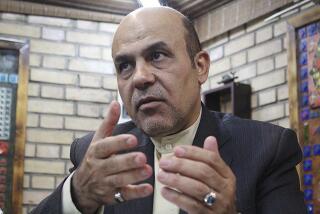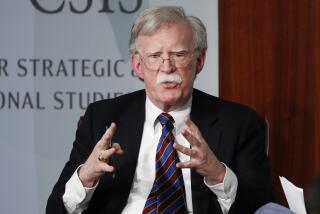Bosnia Reportedly Told Iran of U.S. Spy
- Share via
WASHINGTON — The Muslim government of Bosnia gave Iranian intelligence agents the identity of an undercover Central Intelligence Agency officer working in Bosnia, exposing the American spy to the threat of an Iranian-backed terrorist attack, according to U.S. government sources.
After learning that the Bosnians had compromised the CIA officer to Iranian intelligence, the agency pulled him out of Sarajevo and to safety.
Senior CIA officials involved saw the incident, which has never been disclosed publicly, as one of the first, troubling signs that Iran had used its growing influence in Bosnia to penetrate the Muslim government far more extensively than Washington had believed. That influence has since been well established and U.S. officials have taken steps to try to contain it.
When the incident occurred in the summer of 1995, the officer was serving as the CIA’s liaison to Bosnia’s newly formed security service, which meant that his identity had been declared to Bosnian officials. The move by Bosnian officials to give Iran the U.S. agent’s identity infuriated the CIA, where it was seen as a fundamental betrayal of trust.
The CIA officer’s identity was given to Iran before U.S. peacekeeping troops were sent into Bosnia, so he could not count on the American military for protection.
“It was a war zone, and we didn’t have troops in there yet,” noted an administration official. “It’s better to be safe than sorry.”
At the time, the country’s security service was under the supervision of Bakir Alispahic, Bosnia’s interior minister, who later was identified publicly by the Clinton administration as a critical link between Bosnia’s government and Iran. U.S. officials now assume that Alispahic made the decision to reveal the CIA officer’s identity.
Yet even after learning of the betrayal, administration officials continued to sanction a covert Iranian arms pipeline into Bosnia, according to U.S. officials. Congressional critics have charged that the administration’s 1994 decision to give its tacit approval to an Iranian arms smuggling operation helped expand Iranian influence in the Balkans, thus increasing the likelihood that such threats could occur against U.S. personnel.
Administration officials said that their decision to give a green light to an Iranian arms pipeline cannot be linked to the exposure of the CIA officer. But one official added that the administration never “contemplated protesting the continuation of the arms shipments” as a result of the CIA officer’s exposure.
They acknowledged, however, that the incident added to growing concern about the extent of Iranian influence in the country.
By November 1995, Washington made the removal of Iranian-backed foreign forces from Bosnia a central provision of the Dayton, Ohio, peace accords. By February 1996, the United States demanded that Bosnian President Alija Izetbegovic remove Alispahic from his sensitive post overseeing the Bosnian security apparatus.
The American demands came after a raid by North Atlantic Treaty Organization forces uncovered a terrorist training camp manned by Iranian officials in Bosnia. Alispahic was the direct commander of the camp.
A senior administration official said that the unmasking of the CIA officer was a hidden factor in the U.S. pressure to oust Alispahic.
The betrayal “was an element in our decision” to go after Alispahic, said one official. “And the incident certainly caused us concern about the Iranian presence. In Dayton, we dealt with it. It was not a coincidence that there was strong language about the removal of foreign forces in the Dayton agreement.”
Last June, President Clinton certified that Bosnia had ended its military and intelligence relationship with Iran and had expelled all Iranian military units. Clinton’s certification was required by Congress for the start of a U.S.-funded program to equip and train the Bosnian army.
But administration officials and other sources now concede that Alispahic remains an influential figure with close ties to Izetbegovic.
After he was removed from his high-profile security post last spring, Alispahic was appointed Bosnia’s deputy foreign minister in charge of refugee affairs. He left that post in September, at the time of Bosnia’s presidential elections, but he is now a member of the executive board of Izetbegovic’s political organization. That post “suggests he maintains some influence,” a U.S. official said.
“We didn’t make it a quid pro quo that [Alispahic] get out of the foreign ministry” or the political organization, an administration official said. “We pushed for what we thought were achievable goals, first getting those with Iranian ties out of the military and intelligence areas. We can always come back and deal with other issues later.”
Some officials concede that Iranian Revolutionary Guard personnel and intelligence agents may still be operating out of the large Iranian embassy in Sarajevo but insist they are no longer working jointly with Bosnia’s security service.
More to Read
Sign up for Essential California
The most important California stories and recommendations in your inbox every morning.
You may occasionally receive promotional content from the Los Angeles Times.










